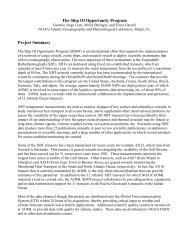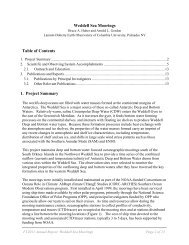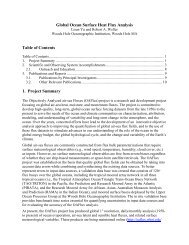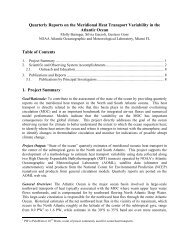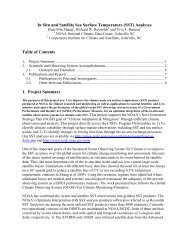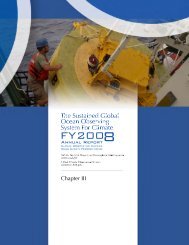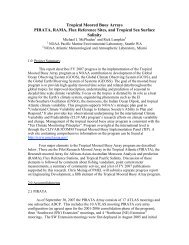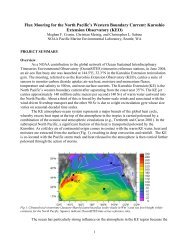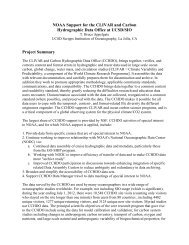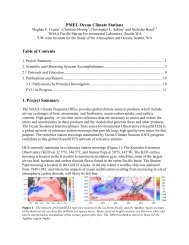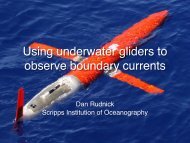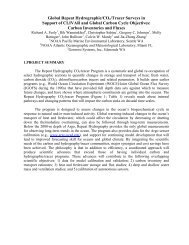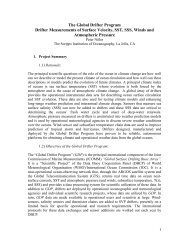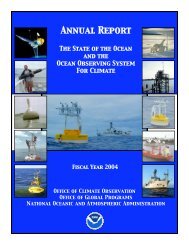GCOS Implementation Plan - WMO
GCOS Implementation Plan - WMO
GCOS Implementation Plan - WMO
Create successful ePaper yourself
Turn your PDF publications into a flip-book with our unique Google optimized e-Paper software.
<strong>Implementation</strong> <strong>Plan</strong> for the Global Observing System for Climate in Support of the UNFCCC<br />
(2010 Update)<br />
• <strong>WMO</strong> Commission for Climatology (<strong>WMO</strong> CCl) – Lead Commission for coordinating international<br />
technical activities under the World Climate Applications and Services Programme (focussing on<br />
the application of climate information in support of socio-economic development) and the World<br />
Climate Data and Monitoring Programme (focussing on data archaeology),.<br />
Scientific Programmes and Advisory/Steering committees to the intergovernmental bodies:<br />
• World Climate Research Programme (WCRP) – sponsored by ICSU, <strong>WMO</strong> and IOC of UNESCO<br />
– comprehensive climate research programme, in particular through the WCRP/<strong>GCOS</strong><br />
Observation and Assimilation Panel (WOAP)<br />
• International Geosphere Biosphere Programme (IGBP) – sponsored by ICSU – programme to<br />
understand the interactive physical, chemical and biological processes regulating the total Earth<br />
system, the changes in this system, and influences from human actions.<br />
• Intergovernmental Panel on Climate Change (IPCC) – sponsored by UNEP and <strong>WMO</strong> –-<br />
assesses scientific, technical and socio-economic information for understanding climate change<br />
and its potential impacts.<br />
• <strong>GCOS</strong> Steering Committee – sponsored by <strong>WMO</strong>, UNEP, UNESCO, and ICSU – provides<br />
scientific, technical and implementation guidance to the <strong>GCOS</strong> Sponsors and has established 3<br />
domain-based scientific Panels and associated Working Groups:<br />
o Atmospheric Observation Panel for Climate (AOPC);<br />
o Ocean Observation Panel for Climate (OOPC);<br />
o Terrestrial Observation Panel for Climate (TOPC); and<br />
o The AOPC Working Group on Atmospheric Reference Observations (WG-ARO);<br />
o The AOPC/OOPC Working Group on Surface Pressure (WG-SP);<br />
o The AOPC/OOPC Working Group on Sea-Surface Temperature and Sea Ice (WG<br />
SST/SI);<br />
o The AOPC/TOPC Working Group on Land-Surface/Atmosphere Issues (WG-LSA);<br />
o The WOAP/AOPC Working Group on Observational Datasets for Reanalysis.<br />
Climate observing systems; <strong>GCOS</strong> made up of contributions from:<br />
• <strong>WMO</strong> Integrated Global Observing System (WIGOS);<br />
o World Weather Watch Global Observing System (GOS) - comprehensive system for<br />
observing meteorological variables used in weather forecasting and other related<br />
applications;<br />
o Global Atmospheric Watch comprehensive observations of atmospheric constituent and<br />
chemical properties on global and regional scales; and<br />
o other <strong>WMO</strong> climate related observing systems;<br />
• IOC/<strong>WMO</strong>/UNEP/ICSU Global Ocean Observing System (GOOS) – permanent global system for<br />
observations, modelling and analysis of marine and ocean variables to support operational ocean<br />
services world-wide.<br />
• FAO/UNEP/UNESCO/<strong>WMO</strong>/ICSU Global Terrestrial Observing System (GTOS) – programme for<br />
observations, modelling, and analysis of terrestrial ecosystems, for facilitated access to terrestrial<br />
ecosystem information, and to support sustainable development.<br />
• IGBP and WCRP and other research observing networks.<br />
Coordination mechanisms and partnerships supporting observational objectives:<br />
• Committee for Earth Observation Satellites (CEOS) – international coordinating mechanism<br />
charged with coordinating international civil spaceborne missions designed to observe and study<br />
planet Earth, including the CEOS Virtual Constellation Teams.<br />
• Coordination Group for Meteorological Satellites (CGMS) – provides a forum in which the space<br />
agencies have studied jointly with the <strong>WMO</strong> technical operational aspects of the global network,<br />
so as to ensure maximum efficiency and usefulness through proper coordination in the design of<br />
the satellites and in the procedures for data acquisition and dissemination.<br />
• Sustained Coordinated Processing of Environmental Satellite Data for Climate Monitoring<br />
(SCOPE-CM) – international coordination mechanism designed to guide the generation of a set of<br />
meteorological long-term fundamental climate data records and ECV satellite products<br />
• Group on Earth Observations (GEO) – international framework on a voluntary basis working<br />
towards coordinated comprehensive and sustained observations of the Earth system within the<br />
Global Earth Observation System of Systems (GEOSS) in order to improve monitoring of the<br />
changing state of the planet, increase understanding of complex Earth processes, and enhance<br />
the prediction of the impacts of environmental change, including climate change.<br />
145



